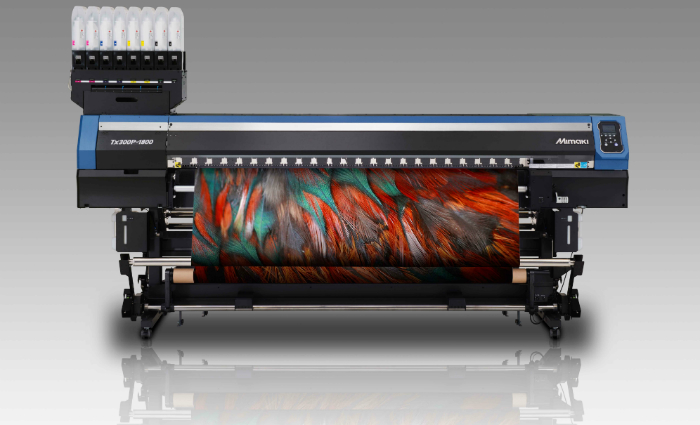Mimaki has updated its Tx300P-1800 and Tx300P-1800B direct-to-textile printers so that they simultaneously load both textile pigment and sublimation dye inks.
This enables the use of a single printer to print directly on a range of textiles without the need to change out ink systems. This new technology, that wasn’t possible until now, is a breakthrough that will improve productivity and increase flexibility for these Mimaki textile printers.
Mimaki offers five different ink types for textile printing, including sublimation dye ink, dispersion dye ink, textile pigment ink, reactive dye ink and acid dye ink. From now on. textile producers can use the two most popular ink types in one single printer.
For example, the Tx300P-1800 and Tx300P-1800B direct-to-textile printers can now simultaneously load TP400 textile pigment ink for cotton and hemp materials as well as Sb420 sublimation dye ink for polyester material. Mimaki says that, since neither ink type generally requires steaming or washing in the post-treatment process, operators will have no need for a large space, a huge quantity of water, or special expertise in handling the printed fabric.
The company says these entry-level printers are suitable for use by designers, fabric workshops, and educational and research institutions.
Mimaki says that, with textile pigment ink TP400, large post-treatment equipment is not required. These inks, which consist of solvent, pigment and binder agent, are fixed through heat without impairing the breathability and water absorbency of the fabric. The result is beautiful printing on cotton and hemp materials and is recommended for interior fabrics, T-shirts and various other apparel applications.
The sublimation dye ink Sb420 is specifically designed for use with pre-treated fabrics, especially polyester. The colour is fixed using heat after printing. Printing on polyester with these inks delivers excellent colour accuracy and reproducibility.
The company says the Tx300P-1800 printer can print directly onto almost any type of natural or man-made fabric and suits thick and woven textiles. The Tx300P-1800B printer uses an automated belt-fed conveyance system. It prints to a broad range of natural and man-made fabrics and suits the production of fashion, clothing and soft furnishing materials. The hybrid ink system for the Tx300P-1800 and Tx300P-1800B direct-to-textile printers will be commercially available later this year.
Textile printers update ink systems


